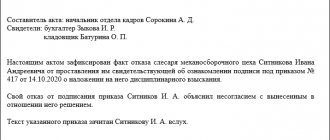When a person is actively looking for a job, he schedules several interviews at once so as not to rely on only one company. Therefore, after a series of interviews, several organizations may be interested in him at once, from which he must choose the most suitable one. In such situations, it is very important to set priorities correctly and understand how to refuse an employer after an interview, so as not to leave an unpleasant impression.
It's best not to burn any bridges, as there's a good chance you'll be able to collaborate in the future. Plus, everyone wants to leave behind memories as a professional in their field, and not as an incompetent amateur. Therefore, you must refuse politely and diplomatically.
- Money and career What to ask at an interview with an employer: 16 main questions Believe me, a lot will depend on your questions and his answers.
Now we will tell you how to do this.
How to politely refuse an employer after an interview
So, you successfully passed the interview, convinced the head of the company of your professional suitability, but ultimately realized that you were not going to work for him. At this stage, it is very important to refuse work politely, because people are already pinning their hopes on you and making some plans.
We won’t beat around the bush, but will immediately give you a working algorithm for constructing your refusal. Moreover, it can be presented to the employer in any form. For example, by phone, by email or in person, immediately after the interview. The choice is yours.
We refuse correctly
Written message
The refusal letter must be submitted to the employee who supervises the position, to the secretariat or personnel department.
A written refusal gives a chance to avoid a personal meeting with the failed employer, but requires compliance with the norms of business correspondence and implies a statement of the reasons for the decision.
This method is used by people who have difficulties with verbal communication, as well as applicants from other regions. You can choose a written form of refusal if you also received an invitation to an interview in writing. A well-designed letter includes several points that will characterize you as a diplomatic and confident player in the labor market, while simultaneously reducing the negative effect:
- A greeting, an address (preferably personal), gratitude for attention to your candidacy and appreciation for productive/pleasant communication.
- Regret and refusal.
- Arguments.
- We wish you success in finding a replacement and successful business.
- A polite farewell.
Undesirable information (refusal) is contained in a “cover” of good messages. This technique of refusal is called the “sandwich strategy” and has been successfully used in politics and business. It is also adopted by recruiters who use this technique to notify applicants of refusals.

Sample letters
“Dear X!
Thank you for your interest in my candidacy. I am forced to inform you that I have already found a more suitable vacancy in another company, and therefore I am withdrawing my candidacy from a position in your organization. I wish you success in finding a worthy employee.
Sincerely,
YY."
Telephone message
Allows you to save time, limit emotional contact that is inevitable during a personal meeting, and at the same time demonstrate loyalty to your partner.
Telephone communication is preferable to letter if the interaction has reached the stage of a follow-up interview, meeting with the immediate supervisor or agreement to work. The algorithm for conducting a conversation in this case is similar to the scheme for composing a written message and includes the same points:
- greetings;
- outgoing call contact reminder;
- regret and refusal;
- statement of reasons;
- wishes of success and farewell.
The complexity of telephone refusal lies in the simultaneously two-way nature of communication. The interlocutor gets the opportunity to challenge the statement, express dissatisfaction, or offer alternative solutions. If the purpose of the call is a decisive refusal, and not a search for a compromise, you should be guided by the following rules:
- Come up with clear reasons for refusal in advance. Find an irrefutable excuse that will hide the real reason.
- Tactfully but firmly adhere to the chosen goal, do not allow the opponent to involve you in the discussion, avoid an apologetic tone and reject counter-offers.
- Regardless of the emotional coloring of the conversation, end the conversation favorably, using the final point of the scheme.
To help the applicant: 7 techniques for a successful interview
Example conversation
“Hello, XX! This is YY. We met about my employment for the position…. Thank you for making a positive decision on my candidacy, but I must inform you that I have found a more suitable vacancy in another company, so I am forced to refuse your offer. I wish you success in your search for an employee."

A personal meeting
This method of voicing a decision on refusal is advisable to use by applicants for senior management positions, specialists of a narrow profile, as well as those who use the method of personal recommendations when searching for a job.
A personal visit to the employer is justified in a situation where confirmation of a position was preceded by a lengthy selection process, multi-stage work with the applicant, negotiations with managers, etc. A visit to the employer is also relevant if the applicant allows for a compromise. This is an expectedly costly and emotionally stressful technique for communicating negative news, but with prudent organization it can become a profitable investment in your professional future and maintain effective connections. The principle of conducting a conversation with a failed employer is based on a written or telephone refusal, but involves longer communication, expanded potential for discussion, the likelihood of vigorous protest and unforeseen variations in the conversation at the initiative of the opponent. The message formula for a personal meeting includes the following components according to the already familiar “sandwich” system:
- expressing gratitude for the time spent (the stage of the listener’s psychological preparation for unfavorable information);
- refusal (may cause an emotional reaction);
- communicating the reasons (in the case of a one-on-one conversation with a representative of the employer, this item is often the subject of lengthy discussions);
- wishes of success and expression of hope for future cooperation; Repeatedly expressing gratitude for the communication.
How to refuse an interview
10 Feb 2021 You have been invited to an interview with a potential employer, but for some reason you will not be able to be at the appointed time. To avoid difficult situations, it is important to know how to properly cancel an interview, both in cases of rescheduling the meeting to another time, and when you decide not to consider the job at all.
We reschedule the meeting correctly
The day before the scheduled interview, you must inform the recruiter by phone or letter that your plans have changed. Of course, it would be better to do this during a phone call, talking directly with a potential employer.
Please note your interest in the job and report any difficulties you may have. As a rule, HR specialists will not go into the reasons for your difficulties. If the reason is due to your current job, explain that there is a mandatory meeting, training, etc. have been scheduled and you are required to attend. To the extent that you would like to discuss the possibilities, you must be professional. A potential employer will appreciate your work ethic and understand the need to reschedule the interview.
Adviсe:
• Don't reschedule an interview just because you want to go out of town for the weekend or it will interfere with your personal plans. Only reschedule when absolutely necessary.
• You should reschedule your interview as soon as you realize that you cannot attend. Keep your calendar ready in case they might reschedule your interview.
• If the real reason is not a family emergency, you should call as soon as possible to reschedule your interview.
• Don't schedule an interview without checking your calendar.
• When talking about the reasons for postponing the meeting, try not to lie. Remember, everything secret sooner or later becomes clear.
How to cancel an interview with an employer?
Canceling an interview without a serious reason is not only frivolous in relation to the employer, but also wrong even in relation to oneself. Before canceling an interview, think carefully about everything. Situations in life are different and perhaps this is truly a necessary measure, then it is worth preparing a polite refusal for the employer to schedule an interview.
What circumstances may affect this:
• You were offered another job and you accepted. A reasonable enough reason for refusal that a potential manager will understand. However, even if you receive a job offer, you should not refuse other interviews. You miss the opportunity to compare offers and working conditions. And perhaps the employer will be interested in you, and you will be offered more favorable conditions.
• You've given it some thought and decided that this job isn't right for you. You should send your resume to the employer as carefully as possible, studying all working conditions. So that you don’t have to refuse later because you suddenly find out that it’s a long way to get to work, or your schedule doesn’t suit you. However, if this happens, try to explain this reason as correctly as possible, so that the recruiter does not decide that you are irresponsible and inattentive.
• You received some new important information about the vacancy or employer, which radically changed your attitude towards this job. Before meeting with an employer, it is very useful to familiarize yourself not only with the activities and history of the company, but also read employee reviews about it. This information will help you get a more detailed picture of the company you plan to work for. And if you understand that the employer is unscrupulous, or the working conditions differ from those stated earlier, then this is a reason not to go to the meeting. Write a letter to the recruiter saying that you will not come to the interview due to new circumstances.
Advice:
Call and explain that you no longer need the job, or that you have accepted an offer from another company. Thank them for their time and attention, and wish them a good day. The main thing is to behave responsibly, logically and professionally. And this will be another feature that will make you stand out from other applicants who do not have their own principles, do as they please every time, and can let the employer down at any moment. This will give you the opportunity to consider vacancies from this company in the future.
How to write a refusal to an invitation to an interview?
When writing your refusal, remember that it is still a business letter and you are still a professional. Therefore, do not forget about the polite address “Good afternoon”; if you know the name of the recruiter, then be sure to indicate it. Briefly state the reasons for the refusal. There is no need to carry on a long story; one or two sentences will be enough. Thank the person for their time and interest in your candidacy. And of course, wish you a good day and success in your further search. Please indicate your full name at the end. Before you send an email, make sure it is written correctly, has the point, and contains no spelling errors.
Refusal letter for interview, sample
Good afternoon, ___________
We have a meeting scheduled for tomorrow at 14.00 for the position of sales consultant. Unfortunately, I have to cancel our interview because I am no longer in need of a job search. At my old job, I received an offer for a promotion, and I accepted it. Thank you very much for your interest in my candidacy and good luck with your search.
Sincerely,
Anastasia Smirnova
Elena, good afternoon
Unfortunately, I decline the invitation to interview at your company. Since I found out that your office is moving to another location and geographical area in the near future, it will be very far for me to get to you. Thank you for your time.
Have a good day,
Svetlana P.
Anna, hello
Thank you very much for the offer, but, unfortunately, this vacancy does not quite suit me, this is not what I am looking for at the moment. I carefully studied the conditions and vacancy and am forced to cancel the meeting. Good luck in your further search.
Ivanova O.
in-which-cases-and-how-to-cancel-an-interview
Job Refusal Forms
- Refusal by phone . First you need to introduce yourself. Next, thank the HR manager for showing interest in your candidacy. Next, communicate your decision and confidently justify it. Express your regrets, wish them success and good luck in finding an employee. Next, politely say goodbye and hang up.
- The message can be sent to the company’s email account, or it can be in writing and delivered in person. It is important to begin the letter by politely addressing the person in charge by name and patronymic. Then thank you for your time. Next, state your refusal and clarify the reasons. In conclusion, wish you success and politely say goodbye.
- A personal visit will be appropriate if the interview took place in several stages. When you find yourself alone with an HR manager, be friendly. Apologize and explain your reasons for refusing the vacant position. As you say goodbye, wish you success in finding a successful candidate.
By phone
There are some rules that must be followed, namely:

greetings;- introducing yourself;
- designation of the time and date of the interview;
- clarification of the name and patronymic of the responsible person;
- clarify whether an HR specialist can talk now;
- wording of gratitude (“Thank you for your interest in my candidacy.”);
- explanation of the reason for the refusal (inconvenient location, inappropriate work schedule;
- wages that do not correspond to qualifications, family circumstances, etc.);
- farewell (“All the best to you, “Have a nice day”).
How to write by email?
There are also some rules:
- The message must contain greetings.
- Next, you can personalize the appeal by indicating the name and patronymic of a specific person.
- It is necessary to inform that you have read the offer and considered the possibility of cooperation.
- And then state the reasons why you cannot come to the meeting with the employer.
- Then politely say goodbye.
The letter must be written in a business style . The words “parasites” and profanity should be abandoned.
How to politely do this after an interview?
After the interview, the applicants' opinion may change. Some applicants will not want to continue further communication with the employer.
There may be the following reasons for refusal::

Inconvenient work schedule.- There are no prospects for career growth.
- Salary does not correspond to skill level.
- Possible business trips.
- Lack of self-confidence and professionalism.
- A more favorable offer with increased wages was received.
- Lost interest in the vacancy while waiting for a decision to be made.
- The job responsibilities were not specified correctly, as a result of which the candidate misunderstood the essence of the work ahead.
Each reason for refusal must be voiced quite convincingly and confidently.
An example of how to refuse an employer after an interview is given below.





